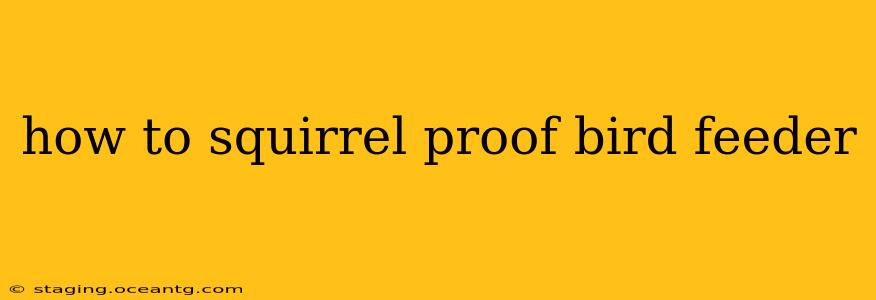Squirrels. Those cheeky, acrobatic bandits of the backyard. While they're undeniably charming, their penchant for raiding bird feeders can be incredibly frustrating for bird lovers. But don't despair! There are numerous effective strategies to outsmart these furry thieves and ensure your feathered friends get their fair share of the feast. This guide will explore various squirrel-proofing methods, helping you choose the best approach for your specific situation.
What Attracts Squirrels to Bird Feeders?
Before diving into solutions, let's understand the problem. Squirrels are attracted to bird feeders for the same reason birds are: easy access to a readily available food source. They're highly intelligent and adaptable, constantly seeking out the easiest way to get a meal. Understanding their motivations is the first step to effective deterrence.
Different Types of Squirrel-Proof Bird Feeders
The market offers a variety of feeders specifically designed to keep squirrels at bay. These feeders utilize various mechanisms to prevent access while allowing birds to feed comfortably.
Cage Feeders:
These feeders surround the food source with a wire mesh cage, allowing smaller birds to access the seed while preventing squirrels from reaching inside. The small openings deter larger animals but still offer ample space for many bird species.
Weight-Activated Feeders:
These feeders are cleverly designed to close or tip when a heavier animal like a squirrel attempts to access them. The weight of the squirrel triggers a mechanism that shuts the feeder, preventing access to the food.
Baffle Feeders:
Baffles are essentially cones or discs placed above or below the feeder, creating a physical barrier that squirrels struggle to overcome. They prevent squirrels from climbing down the feeder pole or reaching the feeder from above.
How to Modify Existing Bird Feeders to Deter Squirrels
If you already own a bird feeder, you don't necessarily need to buy a new one. There are several modifications you can make to improve its squirrel-resistance.
Using Baffles:
You can purchase or even DIY a baffle to add to your existing feeder setup. This is a cost-effective method that works surprisingly well, especially when combined with other squirrel-proofing techniques.
Slick Poles:
Squirrels rely on grip and friction to climb. By using a smooth, slippery pole (metal or PVC pipe works well) to hang your feeder, you make it significantly more difficult for them to reach the food. Consider adding a baffle as well for maximum effectiveness.
Difficult-to-Access Hanging Points:
Hang your bird feeder from a branch or hook that is far enough away from structures that squirrels can use to jump or climb. The more difficult the access, the less likely they are to attempt it.
Other Squirrel Deterrents
Beyond specialized feeders and modifications, there are other methods to deter squirrels from your bird feeder.
Predator Scents:
Some people find success using predator scents like coyote urine near the feeder. The smell is meant to discourage squirrels, but the effectiveness varies. Remember to refresh the scent periodically.
Spicy Food:
Squirrels generally dislike spicy foods. Adding a small amount of cayenne pepper to your birdseed can make it less appealing to them, without harming the birds (use sparingly and ensure it's bird-safe).
Motion-Activated Sprinklers:
These devices detect movement and spray water, startling squirrels and discouraging them from approaching the feeder. This is a more technologically advanced option but can be quite effective.
H2: What kind of bird feeder is best to keep squirrels away?
There is no single "best" feeder, as the effectiveness depends on the specific squirrel species in your area and their level of determination. However, cage feeders and weight-activated feeders generally provide the best squirrel deterrence. Combining a suitable feeder with a baffle and slippery pole often proves extremely effective.
H2: How do I keep squirrels from eating my birdseed?
Keeping squirrels away from your birdseed involves a multi-pronged approach. The most successful strategy combines a squirrel-resistant feeder with deterrents like slippery poles, baffles, predator scents (use cautiously), and strategic placement of the feeder.
H2: Are there any humane ways to deter squirrels?
All the methods mentioned above are considered humane. They discourage squirrels from accessing the food without harming or trapping them. Avoid using traps or poisons, as these are inhumane and can pose risks to other wildlife.
Conclusion
By carefully considering the methods outlined above and selecting the approaches best suited to your situation, you can significantly reduce squirrel activity around your bird feeders and ensure your feathered friends enjoy a plentiful and undisturbed meal. Remember, persistence is key—squirrels are persistent creatures, and it may take time and experimentation to find the perfect solution for your backyard.
